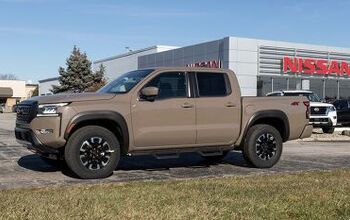Hertz Stalls Stock Sale Amid Market Madness

The Securities and Exchange Commission has urged the recently bankrupted Hertz to halt the sale of stock. The rental agency had hoped to raise half a billion on the sale but repeatedly warned that would-be buyers were gambling, as the stock may soon be worthless.
Bizarrely, this hasn’t discouraged investors from glomming onto shares of bankrupt and near-bankrupt companies. Despite the global economy supposedly hurdling into a recession and mass unemployment, Wall Street hasn’t signaled that anything is amiss.
Still, the SEC has grown concerned with the trend and decided to address them with Hertz, according to a recent filing. Trading of Hertz Global Holdings Inc. was halted on Thursday, placing investors in a holding pattern as everyone speculates whether the bankrupt car renter will have to revise its plan to raise cash by selling new shares.
“We have let the company know that we have comments on their disclosure,” SEC Chairman Jay Clayton said in a CNBC interview on Wednesday. “In most cases when you let a company know that the SEC has comments on their disclosure, they do not go forward until those comments are resolved.”
Hertz did not buck the trend, announcing the prompt suspension of sales “pending further understanding of the nature and timing of the staff’s review.” It’s since been in routine contact with the SEC but informed us it could not say more on the issue at this time. Interesting, because it doesn’t seem to be breaking any rules — just taking an interesting approach to bankruptcy that could leave more than a few investors burned.
Bloomberg offered additional analysis of the situation:
While the SEC generally lets companies sell shares if their disclosures are robust, the regulator probably wants to take a closer look because of the unusual nature and risks of Hertz’s offering, said Thomas Gorman, a partner with law firm Dorsey Whitney and a former senior counsel at the agency.
“On one side of the line is, if you disclose everything then you can sell whatever you want,” Gorman said. “On the other side of the divide is, we have substantive problems with what you’re selling and the offering is so seriously flawed that it shouldn’t go out. I think they are looking at this and saying this is very troubling.”
Hertz’s most actively traded debt, $800 million of 5.5 [percent] notes due 2024, slid 4.75 cents on the dollar in New York to trade at 38 cents. The notes were among the biggest decliners in the high-yield market Wednesday.
Hertz wants to keep things moving in order to capitalize on whatever’s happening with the market right now. Investors seem anything but skittish — and that’s likely to play to its favor. It’s also already received approval from a bankruptcy judge, though the SEC said it will monitor the situation — noting that the bankruptcy proceedings had complicated the matter. But Hertz is in a bad situation, some of it out of its control, and has to do something to soften the blow as it goes through Chapter 11. Expect more on this as the SEC takes everything into consideration.
[Image: vieninsweden/Shutterstock]

A staunch consumer advocate tracking industry trends and regulation. Before joining TTAC, Matt spent a decade working for marketing and research firms based in NYC. Clients included several of the world’s largest automakers, global tire brands, and aftermarket part suppliers. Dissatisfied with the corporate world and resentful of having to wear suits everyday, he pivoted to writing about cars. Since then, that man has become an ardent supporter of the right-to-repair movement, been interviewed on the auto industry by national radio broadcasts, driven more rental cars than anyone ever should, participated in amateur rallying events, and received the requisite minimum training as sanctioned by the SCCA. Handy with a wrench, Matt grew up surrounded by Detroit auto workers and managed to get a pizza delivery job before he was legally eligible. He later found himself driving box trucks through Manhattan, guaranteeing future sympathy for actual truckers. He continues to conduct research pertaining to the automotive sector as an independent contractor and has since moved back to his native Michigan, closer to where the cars are born. A contrarian, Matt claims to prefer understeer — stating that front and all-wheel drive vehicles cater best to his driving style.
More by Matt Posky
Latest Car Reviews
Read moreLatest Product Reviews
Read moreRecent Comments
- W Conrad I'm not afraid of them, but they aren't needed for everyone or everywhere. Long haul and highway driving sure, but in the city, nope.
- Jalop1991 In a manner similar to PHEV being the correct answer, I declare RPVs to be the correct answer here.We're doing it with certain aircraft; why not with cars on the ground, using hardware and tools like Telsa's "FSD" or GM's "SuperCruise" as the base?Take the local Uber driver out of the car, and put him in a professional centralized environment from where he drives me around. The system and the individual car can have awareness as well as gates, but he's responsible for the driving.Put the tech into my car, and let me buy it as needed. I need someone else to drive me home; hit the button and voila, I've hired a driver for the moment. I don't want to drive 11 hours to my vacation spot; hire the remote pilot for that. When I get there, I have my car and he's still at his normal location, piloting cars for other people.The system would allow for driver rest period, like what's required for truckers, so I might end up with multiple people driving me to the coast. I don't care. And they don't have to be physically with me, therefore they can be way cheaper.Charge taxi-type per-mile rates. For long drives, offer per-trip rates. Offer subscriptions, including miles/hours. Whatever.(And for grins, dress the remote pilots all as Johnnie.)Start this out with big rigs. Take the trucker away from the long haul driving, and let him be there for emergencies and the short haul parts of the trip.And in a manner similar to PHEVs being discredited, I fully expect to be razzed for this brilliant idea (not unlike how Alan Kay wasn't recognized until many many years later for his Dynabook vision).
- B-BodyBuick84 Not afraid of AV's as I highly doubt they will ever be %100 viable for our roads. Stop-and-go downtown city or rush hour highway traffic? I can see that, but otherwise there's simply too many variables. Bad weather conditions, faded road lines or markings, reflective surfaces with glare, etc. There's also the issue of cultural norms. About a decade ago there was actually an online test called 'The Morality Machine' one could do online where you were in control of an AV and choose what action to take when a crash was inevitable. I think something like 2.5 million people across the world participated? For example, do you hit and most likely kill the elderly couple strolling across the crosswalk or crash the vehicle into a cement barrier and almost certainly cause the death of the vehicle occupants? What if it's a parent and child? In N. America 98% of people choose to hit the elderly couple and save themselves while in Asia, the exact opposite happened where 98% choose to hit the parent and child. Why? Cultural differences. Asia puts a lot of emphasis on respecting their elderly while N. America has a culture of 'save/ protect the children'. Are these AV's going to respect that culture? Is a VW Jetta or Buick Envision AV going to have different programming depending on whether it's sold in Canada or Taiwan? how's that going to effect legislation and legal battles when a crash inevitibly does happen? These are the true barriers to mass AV adoption, and in the 10 years since that test came out, there has been zero answers or progress on this matter. So no, I'm not afraid of AV's simply because with the exception of a few specific situations, most avenues are going to prove to be a dead-end for automakers.
- Mike Bradley Autonomous cars were developed in Silicon Valley. For new products there, the standard business plan is to put a barely-functioning product on the market right away and wait for the early-adopter customers to find the flaws. That's exactly what's happened. Detroit's plan is pretty much the opposite, but Detroit isn't developing this product. That's why dealers, for instance, haven't been trained in the cars.
- Dartman https://apnews.com/article/artificial-intelligence-fighter-jets-air-force-6a1100c96a73ca9b7f41cbd6a2753fdaAutonomous/Ai is here now. The question is implementation and acceptance.


































Comments
Join the conversation
@Arthur Dailey--If you haven't already seen it go on Jay Leno's site where he has a video on his Merlin engine going over the history of the Merlin and running his own Merlin engine which is not in a car or airplane. A really nice engine with lots of power.
Maybe Hertz's fortunes are suffering from their former association with OJ Simpson.